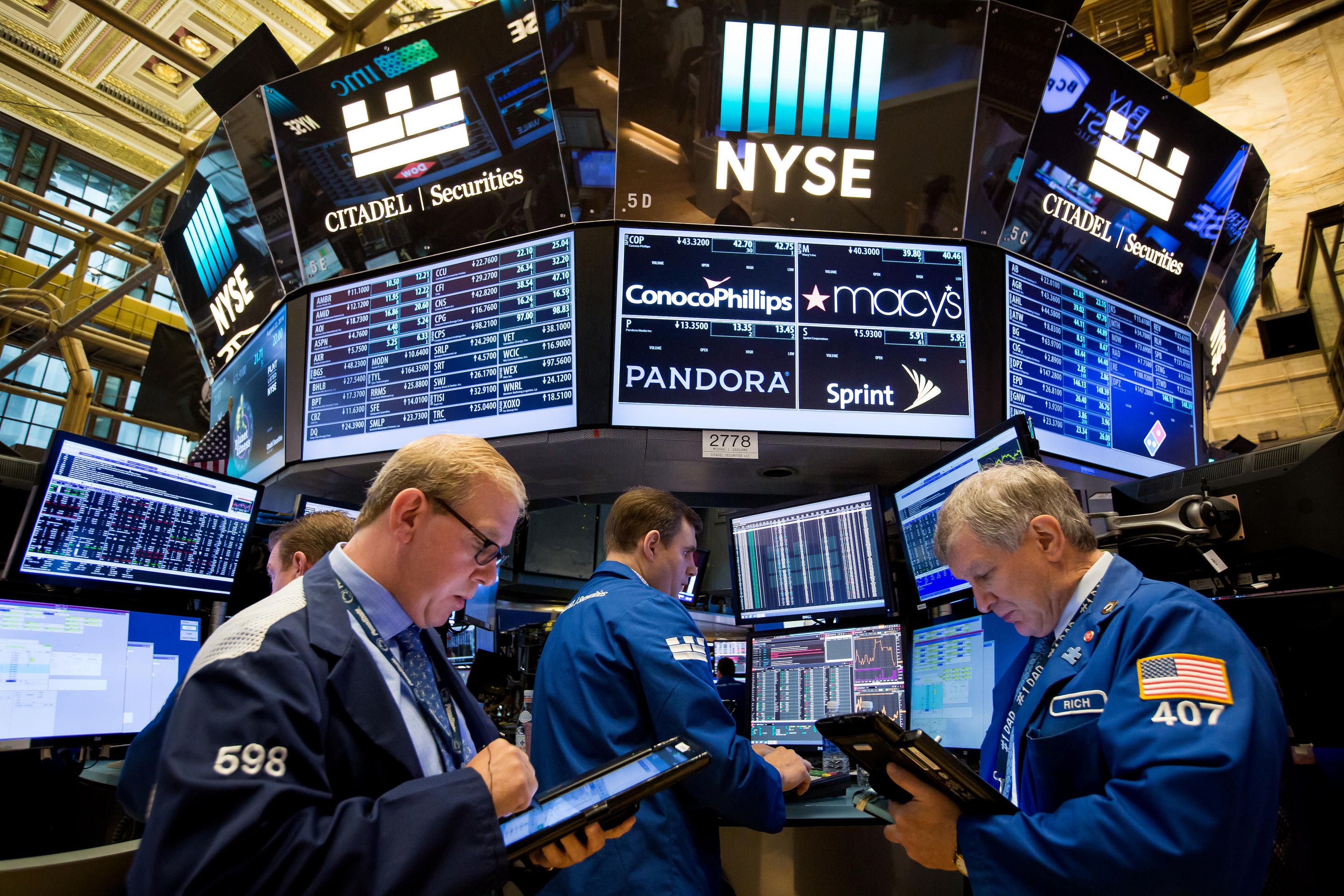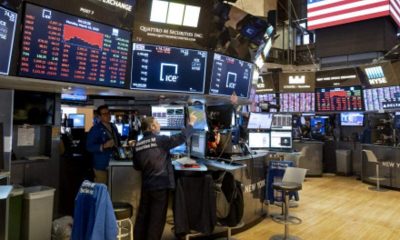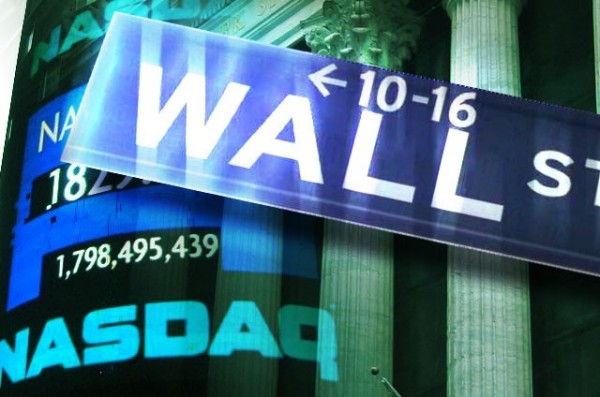Economy
Ongoing Trade Concerns Weigh on US Stocks

By Investors Hub
The major U.S. index futures are currently pointing to a lower opening on Monday, with stocks likely to see some further downside following the pullback seen late in the previous session.
Ongoing concerns about the escalating U.S.-China trade dispute are likely to weigh on Wall Street after Google suspended some of its business with Chinese tech giant Huawei.
Google has cut Huawei off from business involving the transfer of hardware, software and technical services, complying with an order by President Donald Trump blocking the sale or transfer of U.S. technology to Huawei.
?We are complying with the order and reviewing the implications,? a Google spokesperson said, noting services such as Google Play and the security protections from Google Play Protect will continue to function on existing Huawei devices.
Overall trading activity may be somewhat subdued, however, as a lack of major U.S. economic data may keep some traders on the sidelines.
Reports on new and existing home sales and durable goods orders are likely to attract attention in the coming days along with the minutes of the latest Federal Reserve meeting.
Stocks showed wild swings over the course of the trading session on Friday before ending the day mostly lower. The major averages recovered from an initial move to the downside only to pull back sharply late in the session.
At the end of the day, the major averages were all firmly in negative territory. The Dow fell 98.68 points or 0.4 percent to 25,764.00, the Nasdaq slumped 81.76 points or 1 percent to 7,816.28 and the S&P 500 dropped 16.79 points or 0.6 percent to 2,859.53.
The major averages also closed lower for the week. The Nasdaq tumbled by 1.3 percent, while the Dow and the S&P 500 slid by 0.7 percent and 0.8 percent, respectively.
Reflecting recent market sensitivity to trade-related news, the late-day pullback came on the heels of a CNBC report indicating negotiations between the U.S. and China appear to have stalled.
Citing two sources briefed on the status of trade talks, CNBC said scheduling for the next round of negotiations is “in flux” because it is unclear what the two sides would discuss.
Sources told CNBC discussions regarding scheduling the next round of talks have not taken place since President Donald Trump signed an executive order ramping up scrutiny of Chinese telecom companies.
Lingering concerns about the escalating trade dispute between the U.S. and China also contributed to the initial weakness on Wall Street.
While Trump has sought to blame China for backing out of a nearly completed trade deal, a spokesperson for China’s Ministry of Commerce claims the U.S. is responsible for serious setbacks in the trade talks.
Commerce Ministry spokesperson Gao Feng accused the Trump administration of “bullying behavior” with a recent increase in tariffs, according to state-run Chinese news agency Xinhua.
“It is regrettable that the U.S. side unilaterally escalated trade disputes, which resulted in severe negotiating setbacks,” Gao said.
He added, “We urge the U.S. side to correct wrongdoings as soon as possible to avoid causing heavier damages to businesses and consumers in both countries and dragging down the global economy.?
However, concerns about trade waned after the Trump administration officially delayed imposing tariffs on imported automobiles and parts for up to six months, confirming media reports from earlier this week.
A White House statement noted Trump has directed U.S. Trade Representative Robert Lighthizer to negotiate agreements to address the national security threat posed by auto imports.
On the U.S. economic front, the University of Michigan released a report showing a substantial improvement in consumer sentiment in May, although the data was recorded mostly before trade negotiations with China collapsed.
The preliminary report showed the consumer sentiment index surged up to 102.4 in May from 97.2 in April, reaching its highest level in fifteen years. Economists had expected the index to inch up to 97.5.
Oil service stocks showed a substantial move to the downside over the course of the trading session, dragging the Philadelphia Oil Service Index down by 3.2 percent. The sell-off by oil service stocks came amid a modest decrease by the price of crude oil.
Significant weakness also emerged among semiconductor stocks, as reflected by the 2 percent slump by the Philadelphia Semiconductor Index.
Natural gas, oil producer, and networking stocks also saw considerable weakness on the day, notable strength was visible among computer hardware stocks.
Shares of Cray Inc. (CRAY) soared 22.5 percent after she supercomputer maker agreed to be acquired by Hewlett Packard Enterprise (HPE) for $1.3 billion in cash.
Economy
Nigeria to Export New Crude Grade Cawthorne in March

By Adedapo Adesanya
The Nigerian National Petroleum Company (NNPC) Limited is set to commence export of a new light, sweet crude grade known as Cawthorne from March 2026.
According to a report by Reuters, an NNPC spokesperson confirmed the development, describing it as part of efforts to increase output and consolidate Nigeria’s recent recovery in crude oil production.
The move aligns with Nigeria’s broader strategy to boost production after years of constraints caused by pipeline vandalism, crude theft, and unrest in oil-producing regions.
This follows the launch of two other new grades, Obodo in 2025 and Utapate in 2024, Nigeria, whic,h as Africa’s top oil exporter, seeks to strengthen its standing within the Organisation of the Petroleum Exporting Countries and its allies (OPEC+)
Cawthorne crude is scheduled for export in the third week of March and has an API gravity of 36.4, making it similar in quality to Nigeria’s Bonny Light, which is prized for high petrol and diesel yields.
According to Reuters, citing a trading source, the state oil national company issued a tender last week for cargo loading between March 24 and 25.
Analysts at Kpler noted that the new grade is expected to be exported via the Floating Storage and Offloading (FSO) vessel Cawthorne, which has a storage capacity of about 2.2 million barrels. The vessel is designed to enhance transportation and production from Oil Mining Lease (OML) 18 and nearby assets in the Eastern Niger Delta.
Kpler estimates that, based on storage capacity, Cawthorne could increase Nigeria’s crude and condensate output from roughly 1.65 million barrels per day to around 1.7 million barrels per day for the remainder of the year.
Nigeria’s crude oil production recently dropped from the OPEC+ quota of 1.5 million barrels per day, with output at 1.48 million barrels per day recorded in January, according to OPEC data.
Beyond increasing Nigeria’s crude offerings to the international market, the introduction of Cawthorne could also attract buyers seeking specific light, sweet crude qualities, buoy foreign exchange earnings, which would help strengthen government revenue and ease borrowing needs.
New crude grades are typically differentiated by sulfur content, API gravity, and production source, enabling producers to target specific refinery configurations and market segments.
In November 2024, NNPC officially launched the Utapate crude oil blend in the international market, describing it as a milestone for Nigeria’s export profile.
Earlier in July 2024, NNPC and its partner, Sterling Oil Exploration & Energy Production Company (SEEPCO), lifted the first 950,000-barrel cargo of Utapate crude, which was shipped to Spain.
Economy
Moniepoint Research Shows Diminishing Role of Cash in Nightlife Payments

By Modupe Gbadeyanka
A new report released by Africa’s leading all-in-one financial ecosystem, Moniepoint Incorporated, has revealed that the use of cash for financial transactions is gradually dying due to security concerns.
The study, which looked into transaction data of over 27,000 clubs, bars, and lounges, showed that bank transfers dominated, followed closely by card payments, with cash actively discouraged. It was observed that transfers outpace card payments by nearly 2 million transactions during peak nighttime hours across its network.
In the research titled The Business of Community Nightlife in Nigeria, findings provided a rare, data-driven look into the country’s informal night economy.
While high-end Detty December venues grabbed headlines with daily revenues of N360 million and table prices reaching N1.2 million, Moniepoint’s study shifted the spotlight to the “community nightlife” where roadside bars, suya spots, and neighbourhood joints form the bedrock of social life for millions of Nigerians.
One of the study’s most operationally significant findings concerns the timing of spending. Nightlife in Nigeria runs late, but economically, the night is decided early.
Transaction volumes begin climbing sharply from 8 pm, peak before midnight, and then decline steadily even as venues remain full. By the time the night is at its longest, purchasing activity has already wound down.
However, for bar operators, this has clear practical implications – the most critical hours for staffing, stocking, vendor payment and cash flow management are the earliest hours of the day between midnight and 6 am.
The report further underscores the sector’s role in employment, noting that local bars typically expand their workforce by 30-50 per cent on peak nights. Conservative estimates suggest that at least 54,000 people are engaged in nightlife labour every night across Nigeria.
It was also observed that the most common transaction narrations from the data sourced – “food”, “pay”, “sent”, “pos”, “cash” – reflect the full breadth of nightlife spending: street food, club entry, lounge tabs, transport, and afterparties. Digital payments have gained huge traction in Nigeria’s social space.
While alcohol remains a key revenue driver, the data shows that food is the quiet stabiliser of Nigeria’s night economy, particularly in local and informal settings. In several neighbourhood venues, bottled water and meals outsell beer and spirits, especially early in the evening.
Lagos leads in sheer concentration of nightlife establishments, with 4,856 bars, clubs, and lounges on the Moniepoint network. FCT follows with 2,515, then Rivers (2,362), Delta (1,930), and Edo (1,574).
Katsina leads the country in nighttime food truck payment value, with vendors pulling in over N130 million in the last 12 months. Kwara State leads in transaction count. Nigeria’s nightlife economy is distributed, not overly elitist.
On the lending side, the report noted that a significant share of loan requests from bar and lounge operators is directed toward renovations, furniture, lighting, and sound systems, showing that investments are intended to attract and retain customers in a competitive sector where ambience plays a decisive role.
Commenting on the report, the chief executive of Moniepoint, Mr Tosin Eniolorunda, said, “Nigeria’s local bars and night-time operators are not peripheral to the economy; they are a critical part of its architecture. We see a substantial and sustained economic sector that employs hundreds of thousands of Nigerians every night and deserves the same attention we give to agriculture, healthcare, and retail.
“Our goal is to make sure every one of those businesses has the tools to grow. From giving credit to finance renovations and sound systems to providing same-day settlement that allows vendors to restock and with tools like Moniebook that power inventory management and reconciliation, Moniepoint is ensuring that this vital artery of the nation’s economy remains viable and empowering.”
Economy
CBN Reduces Interest Rate by 50 Basis Points to 26.50%

By Adedapo Adesanya
The Central Bank of Nigeria (CBN) has cut the interest rate by 50 basis points to 26.50 per cent from 27 per cent.
Nigeria’s apex bank announced this during its two-day 304th Monetary Policy Committee (MPC) meeting, which concluded on Tuesday in Abuja.
This comes after the country’s interest rate cooled in January to 15.10 per cent from 15.15 per cent, according to the National Bureau of Statistics (NBS), strengthening the case for a reduction.
The CBN Governor, Mr Yemi Cardoso, said all members of the MPC unanimously agreed upon the decision.
“The committee decided to reduce the monetary policy rate by 50 basis points to 26.50 per cent,” he said.
Mr Cardoso stated that the liquidity ratio was maintained at 30 per cent, and the standing facilities corridor was adjusted to +50 to -450 basis points around the monetary policy rate.
He said the committee retained the Cash Reserve Ratio (CRR) at 45 per cent for commercial banks and 16 per cent for merchant banks, while the 75 per cent CRR on non-TSA public sector deposits was equally maintained.
The CBN uses the MPR, which works as the benchmark interest rate, to manage inflation, macroeconomic stability, and liquidity.
Last November, the MPC retained the Monetary Policy Rate (MPR) at 27.00 per cent. The last time the apex bank cut interest rates was in September last year, to 27 per cent from 27.50 per cent after a series of easing in inflation.
Market analysts had argued for higher interest cuts due to results seen in the CBN’s inflation targeting framework. Meanwhile, some say the 50 basis points reduction will offer a temporary reprieve as inflation heads for a single-digit target in the coming months.
-

 Feature/OPED6 years ago
Feature/OPED6 years agoDavos was Different this year
-
Travel/Tourism10 years ago
Lagos Seals Western Lodge Hotel In Ikorodu
-

 Showbiz3 years ago
Showbiz3 years agoEstranged Lover Releases Videos of Empress Njamah Bathing
-

 Banking8 years ago
Banking8 years agoSort Codes of GTBank Branches in Nigeria
-

 Economy3 years ago
Economy3 years agoSubsidy Removal: CNG at N130 Per Litre Cheaper Than Petrol—IPMAN
-

 Banking3 years ago
Banking3 years agoSort Codes of UBA Branches in Nigeria
-

 Banking3 years ago
Banking3 years agoFirst Bank Announces Planned Downtime
-

 Sports3 years ago
Sports3 years agoHighest Paid Nigerian Footballer – How Much Do Nigerian Footballers Earn















